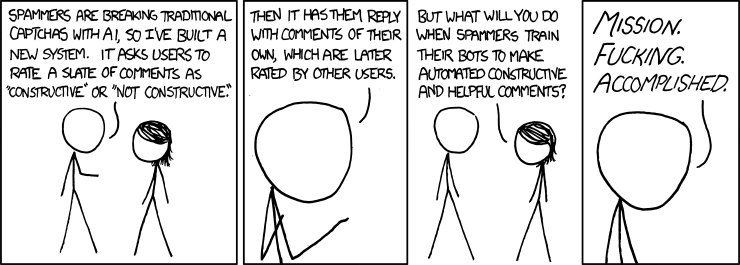There's an lovely relevance (or biscuit) conditional in the latest edition of BBC Radio's
More or Less, a programme about statistics. It's in the programme broadcast on 1st October 2010, currently available
here, and eventually to be archived
here.
The sentence uttered:
If you are still alive, that was Matt Parker, the stand-up mathematician.The context:
Introducing a guest item about the risks of death associated with different activities, the host announces that “there is a 0.00003 % chance that you will die while listening to Matt's essay.” (This is at about 20:40 minutes into the programme.) At the end of the essay (around 24:00), the host picks up again with the sentence quoted above.
What does it mean to say that this is a relevance conditional? Well, the way that the sentence is used here, it is clear that the main clause of the conditional (‘that was Matt Parker, the stand-up mathematician’) is true regardless of whether the proposition given by the if-clause ‘you are still alive’ is true or false. So it is more like the second group of examples below than the first, or the third, and like the other relevance conditionals it sounds very odd indeed if you put then in:
?? If you are still alive, then that was Matt Parker, the stand-up mathematician.
Normal (hypothetical) conditionals
If you heat water, (then) it boils.
If John has restocked it, (then) there’s beer in the fridge.
Relevance conditionals
If I may be honest, (??then) you are not looking good.
If you are thirsty, (??then) there’s beer in the fridge.
Factual conditionals
If it is stupid (then) you shouldn’t bother with it.
If he’s so smart (then) why isn’t he rich?
These examples and the labels for the different uses of conditionals (they are not really different types*) are from Bhatt, R. & Pancheva, R. (2006). Conditionals. In M. Everaert & H. C. van Riemsdijk (Eds.), The Blackwell Companion to Syntax. (pp. 639–687). Oxford: Blackwell.
Why the alternate name, biscuit conditionals? That is what philosophers usually call them, following J.L. Austin's example:
There are biscuits on the sideboard if you want some.
(from p 212 of Austin, J.L. (1970) Ifs and cans. In Philosophical Papers, 2nd ed. London: Oxford University Press: 205–232.)
*Since (e.g.) there might be circumstances in which your being thirsty causes** there to be beer in the fridge (or vice versa***) and in those cases an utterance of “If you are thirsty, (then) there’s beer in the fridge,” will express a factual normal, i.e. hypothetical conditional. See p 406 of DeRose, K. & Grandy, R. E. (1999). Conditional assertions and ‘biscuit’ conditionals. Noûs, 33(3), 405-420.
**Other relations than causality are possible, but that is a topic for another post...
***For example, we know that Smith puts salt in your drinking water sometimes and this makes you thirsty (but you never get thirsty otherwise). We also know that he only does this if he knows that there is beer in the fridge. Then we have good grounds to think that it is true to say “If you are thirsty, (then) there’s beer in the fridge.”

